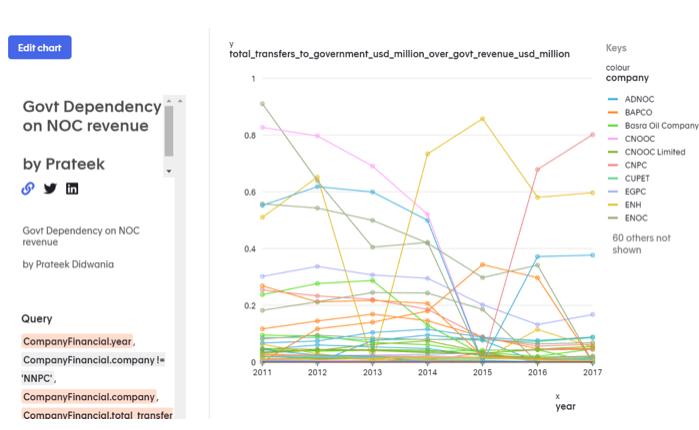
First-ever National Oil Company Hackathon Yields Winning Insights
During the last week of September, NRGI partnered with Count to run an online hackathon using a selection of open data from our National Oil Company Database.
A hackathon is an event where people typically meet to engage in collaborative programming around specific challenges. In the case of this virtual hackathon, we challenged people to remotely dive into our database and analyze the contents. Participants were given a choice of two challenges and the option to analyze the data in Count’s online tool or with their own choice of software.
The challenges set were:
- What do trends in the national oil companies dataset tell us about the countries/regions that will be most in the spotlight during the energy transition?
- How do you assess the evolution of the economic and financial success of national oil companies, or of particular NOC(s), over time?
These challenges elicited lots of interesting ways to cut and analyze the data, which is exactly what we were hoping for!
NRGI launched the National Oil Company Database in April 2019. It’s the only open data resource for standardized financial and operational data of national oil companies, and we aim for it to be the go-to resource for journalists, civil society groups, researchers and public officials working in the oil and gas sector. However, we know little about how people outside these groups might engage with the database and the fresh ideas and analysis approaches that new audiences may have.
NRGI’s approach to data is evolving and hosting an online hackathon is a step along that trajectory. We aim to present open data on the issues we care about that are accessible to those with and without specialist data skills. This is a passion we share with Count and one of the reasons we were excited to partner on this hackathon and experience firsthand how Count’s tool makes using data easier. In addition to accessibility, we aim to provide training and opportunities for anyone with interest or potential use for our data. The hackathon has allowed us to connect with a new community of data enthusiasts.
We are also committed to contextualizing our open data sets and encouraging others to blend our data with other information to understand wider developments. In the Count tool we included population and aid spending data for participants to include in their analysis.
The winner of the competitive element of the hackathon was Prateek Didwania with a submission on how NOCs deliver value to their countries. Below is one of the three charts included in the submission which, utilizing Count’s tool, shows the extent of the reliance of Kuwait and Saudi Arabia government budgets on revenue generated by their national oil companies.

Access the National Oil Company Database. Play with the selected NOC Database Data in Count’s tool.
Anna Fleming is a research and data officer at the Natural Resource Governance Institute.
